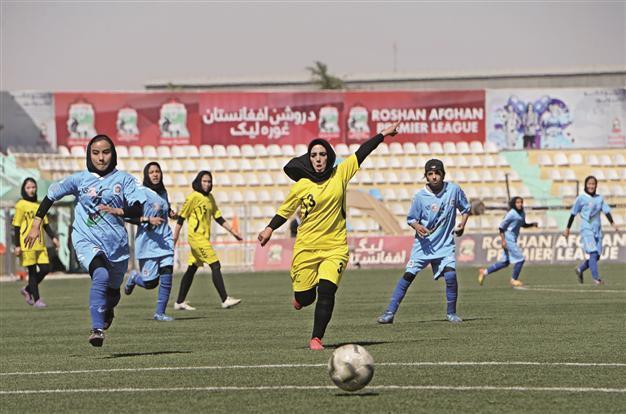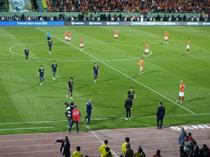Women’s rights on sporting put Saudi Arabia, Iran on defensive
James M. Dorsey

An Afghan woman footballer for the Kabul team (C) vies for the ball with her Herat opponent (L) in a match at the Afghanistan Football Federation (AFF) Stadium in Kabul, Oct 3. AFP photo
The struggle for women’s right to engage in sports and attend sporting events is commanding increased attention with the hunger strike of a British-Iranian national incarcerated in Tehran’s notorious Evin prison, the expected arrival in Saudi Arabia of Australian women fans for the Asian Champions League final, and the rare appearance of Saudi women in an all-male stadium in Abu Dhabi.The issue of women’s rights also rose on the international sporting agenda with the recent withdrawal of the Qatari women’s basketball team from the Asian Games, after they were banned from wearing headscarves. That incident underlined the fact that women’s rights also include the right to compete with headwear that meets safety and security standards and is culturally acceptable.
In response to the withdrawal, the International Basketball Federation (FIBA) said it would ease the ban next year. Football paved the way for accommodating religiously observant women athletes with FIFA’s acceptance two years ago of the principle that women were allowed to wear approved headgear.
The increased attention on women’s sporting rights has put Saudi Arabia and Iran - the two Middle Eastern nations that ban women from entry into stadia during competitions - on the defensive, and it also raises questions about the international sporting community’s forcefulness in opposing restrictions that violate fundamental rights. After meeting Saudi Arabia’s newly appointed Olympic chief Prince Abdullah bin Mosaad bin Abdulaziz, International Olympics Committee (IOC) President Thomas Bach said last month that women’s rights were being discussed. Saudi Arabia failed to field women athletes at the recent Asian Games, after it was forced by the IOC to allow all of two expatriate women to compete in the 2012 London Olympics. Rather than point to the kingdom’s long-standing denial of women’s rights rooted in culture and justified by a puritan interpretation of Islam, Mohammed al-Mishal, the secretary-general of Saudi Arabia’s Olympic Committee, said Saudi Arabia did not have women athletes who would have qualified for the 2014 Asian Games.
However, al-Mishal indicated that despite Saudi Arabia’s promise to field women athletes at the 2016 Olympics in Rio Janeiro, they would be limited to sports endorsed by a literal interpretation of the Quran. The Saudi official said the kingdom was training women to compete in equestrian, fencing, shooting, and archery - Olympic contests that are “accepted culturally and religiously in Saudi Arabia.”
Human Rights Watch Middle East and North Africa director Sarah Leah Whitson dismissed al-Mishal’s defense as “excuses.” “Two years after the London Olympics, the time for excuses is over – Saudi Arabia needs to end its discrimination against women and ensure women’s right to participate in sport on an equal basis with men,” Whitson said. Saudi Arabia has taken small steps toward expanding women’s ability to engage in sports. The country’s Shura Council, a consultative assembly, has urged the education ministry to study the possibility of introducing physical education for girls in public schools, which could lead to a lifting of the ban on female sports in public schools.
Moreover, the authorities last year began licensing private sports clubs for women. Saudi Arabia has also struggled for years with proposals to build separate women’s sections in stadia – a move that has been staunchly resisted by the country’s conservatives. Nevertheless, Manal al-Dabbagh became the first Saudi woman to be allowed to photograph a football match inside a Saudi stadium in August.
Writing on CNN’s website, Lina K. Almaeena, a prominent Saudi promoter of women’s sports, noted that Saudi officials’ promises to enhance opportunities for women remained unfulfilled because of “logistical challenges” such as a lack of profession female professionals and adequate space that would ensure that women are shielded from the view of men. As a result, the government has yet to include physical education in the curricula of girls’ schools and enable women to use neighborhood facilities and train for international competitions. With the exception of the Equestrian Federation, there are no women members of boards of Saudi sporting associations. The absence of women board members in the case of the Saudi football association violates a decision of the West Asian Football Federation that obliges its members to put women’s football rights on par with those of men and include women on their boards.
The issue of women’s stadium attendance will present itself again when Australia’s Western Sydney Wanderers meet Al-Hilal in the Asian Champions League finals in Riyadh on Nov. 1. Australian media has expressed concern whether female and Jewish supporters would be granted visas for the match. Saudi Arabia long ago lifted its restrictions on allowing Jews into the kingdom and has recently facilitated the attendance of sporting events by Brazilian and New Zealand women fans.
The granting of entry to stadia to foreign women supporting a visiting team has sparked heated debate in Saudi Arabia. Controversy erupted in February when a group of female U.S. Congressional staffers were allowed to attend a match in a Riyadh stadium from which Saudi women were barred.
Saudi Arabia’s failure to forcefully act on repeated promises and follow-up on its concession to pressure to field women athletes at the London Olympics suggests that achieving women’s sporting rights is a lengthy battle, as indicated by the imprisonment of 25-year old British-Iranian dual national Ghoncheh Ghavami. International pressure will likely have to involve more than efforts at quiet behind-the-scenes persuasion.
Hunger strike in Iran
Ghavami was charged with spreading propaganda against the Iranian government after she attempted, with more than a dozen other women, in June to enter a stadium where the Iranian national men’s volleyball team was playing Italy. To be fair, Iran in contrast to Saudi Arabia, encourages women’s sports even if it bars women from stadia.
Writing in The Guardian, journalist and author Azadeh Moaveni argued in the case of Ghavami that international pressure on Iran to adhere to human rights standards would be more effective and “seem less a political tool to batter Iran when it is expedient than a permanent concern” if the Islamic republic’s critics “strive for is consistency, including human rights concerns as part of the ongoing political approach to Iran so that it becomes a fixed expectation in Tehran as well.” That is true not only for Iran but also the struggle for women’s sporting and human rights in Saudi Arabia as well as elsewhere in the world.
















